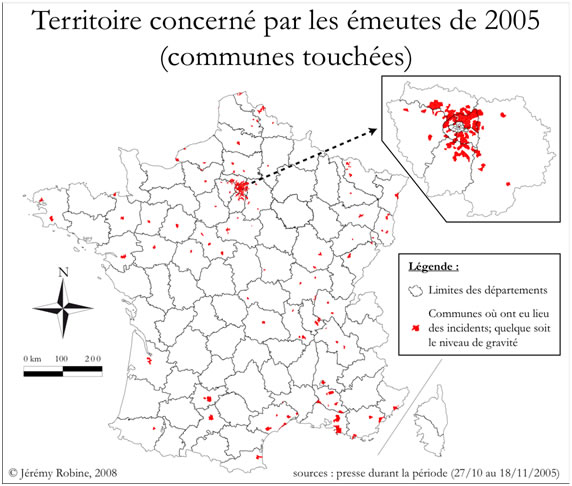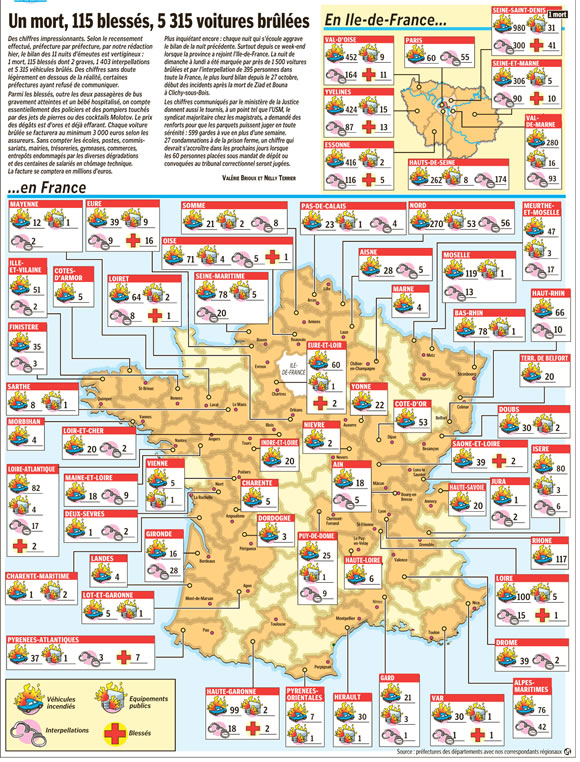 Introducing Jérémy Robine
Introducing Jérémy Robine
Jérémy Robine (Paris, 1980) obtained his PhD in 2009 with a dissertation about urban problems and national identity, “Banlieue et nation: enjeu géopolitique”. Dr. Robine is a consultant and editor of the French geopolitical journal Hérodote. This interview focuses on the multicultural nature of France. Dr. Robine gives his views on issues such as national identity, “ghettos”, feelings of exclusion, the war on memories and the urban riots of 2005.
Interview
French “ghettos”
What are the main features of the French “ghettos” in terms of social-geographic factors and representation (identity)?
French ghettos are different from the ones in the US. French ghettos are predominantly socially homogeneous, not ethnically.
Why have some French suburbs turned into “ghettos”?
Before the war, France recorded low birth rates, construction activity was very limited and existing housing decayed. After the Second World War, France suffered from a severe shortage of housing. Therefore, the French government decided to build so-called «grands ensembles» for the middle class. Lack of space forced the government to develop the new neighbourhoods in the periphery of urban areas which suffered from a lack of services and shops.
In the 1970s, the middle class gradually moved from the «grands ensembles» to better housing like little houses (pavillons) and renovated buildings in urban centers. As a result, African immigrants and their children nowadays account for an estimated half of the population of the derelict «grands-ensembles».
Identities
Why do feelings of exclusion exist among large groups of Arabs and blacks in France?
Discrimination and lack of political representation explain the perceived exclusion of these groups. Discrimination is present on labour market (skilled jobs) and housing market and in political and media discourses. Many young French people who descend from African immigrants suffer from inequality and lack of political representation. Accordingly, they increasingly consider the « republican values » « Liberté, Équalité, Fraternité » an illusion.
What is the “war of memories”? Why does it have an impact on the national identity of France?
The “war of memories” originates in France’s colonial history, and especially the Algerian independence war. Nowadays, there exists a wide discrepancy between the views of French men who fought in Algeria and Algerian immigrants who fought for independence with the FLN (Front de Libération National Algérien).
On top of that, France hosts repatriated people, who were born in Algeria and considered this country as their homeland. These Europeans and sephardi Jews lost everything as they had to leave Algerian very swiftly.
A vital question in this respect is how to manage these conflicting memories and their impact on the national identity of France.
Democratic process
Which impact do the tensions in the “ghettos” have on the parliamentary and presidential elections?
Ghettos are a source of violence and crime and right-wing political parties have exploited the related xenophobic sentiments among the population to attract votes.
President Nicolas Sarkozy won the 2007 elections thanks to the 2005 riots and their misrepresentation in the media. One of Sarkozy’s campaign promises was the establishment of a ministry for immigration and national identity. Sarkozy eventually won thanks to votes of National Front supporters.
To what extent have recent developments reduced support among the “ghetto” population for democracy at the benefit of militant organisations?
Looking back, we can say that the riots were far less severe than the media made us believe (see maps below). This explains why a part of the ghetto’s inhabitants have lost faith in the electoral democracy.
Recommendations
What are your policy recommendations to the French government regarding “ghettos”?
First, the ghetto areas need to be re-build from scratch. The bad image of some quarters makes that no one wants to live there. In contrast to the US, cities in France have a relatively small territory and a rather high population density, with little remaining space to build new housing. In addition, the financial resources of the authorities are insufficient to fund the necessary construction works swiftly.
Second, the government should ensure the strict enforcement of existing anti-discrimination legislation. Related court rulings show that this is not the case at the moment.
Third, the authorities should foster political participation and representation of the minorities. I don’t know if affirmative action would be the most effective way, but something must be done soon.
Fourth, I would advise the government to re-consider the national identity and common destiny of France. The fight against «psychological exclusion» should be central in this process, not electoral considerations.
Which advice would you give to media that report about tensions in “ghettos”?
The media should stop making caricatures of minorities and using a sensational style in reporting about minority related issues. These changes would help in making mainstream views on integration more constructive.


